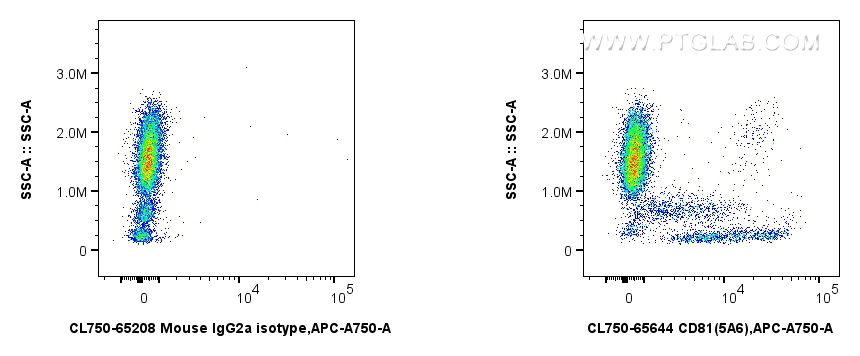验证数据展示
经过测试的应用
| Positive FC detected in | human peripheral blood leukocytes |
推荐稀释比
| 应用 | 推荐稀释比 |
|---|---|
| Flow Cytometry (FC) | FC : 5 ul per 10^6 cells in 100 μl suspension |
| This reagent has been pre-titrated and tested for flow cytometric analysis. The suggested use of this reagent is 5 ul per 10^6 cells in a 100 µl suspension or 5 ul per 100 µl of whole blood. | |
| Sample-dependent, Check data in validation data gallery. | |
产品信息
CL750-65644 targets CD81 in FC applications and shows reactivity with human samples.
| 经测试应用 | FC Application Description |
| 经测试反应性 | human |
| 免疫原 |
Human OCI-LY8 cell line 种属同源性预测 |
| 宿主/亚型 | Mouse / IgG2a |
| 抗体类别 | Recombinant |
| 产品类型 | Antibody |
| 全称 | CD81 molecule |
| 别名 | TAPA1, S5.7, CD81 molecule, CD81 antigen, 5A6 |
| 计算分子量 | 26 kDa |
| GenBank蛋白编号 | BC002978 |
| 基因名称 | CD81 |
| Gene ID (NCBI) | 975 |
| ENSEMBL Gene ID | ENSG00000110651 |
| 偶联类型 | CoraLite® Plus 750 Fluorescent Dye |
| 最大激发/发射波长 | 755 nm / 780 nm |
| 形式 | Liquid |
| 纯化方式 | Protein A purification |
| UNIPROT ID | P60033 |
| 储存缓冲液 | PBS with 0.09% sodium azide and 0.5% BSA, pH 7.3. |
| 储存条件 | Store at 2-8°C. Avoid exposure to light. Stable for one year after shipment. |
背景介绍
CD81 (also known as TAPA1 or TSPAN28) is a membrane protein of the tetraspanin superfamily, which are characterized by the presence of four conserved transmembrane regions. Many of these members are expressed on leukocytes and have been implicated in signal transduction, cell-cell interactions, and cellular activation and development. CD81 is involved in signal transduction and cell adhesion in the immune system (PMID: 9597125). CD81 has also been identified as en essential receptor for HCV (hepatitis C virus) (PMID: 21428934).
实验方案
| Product Specific Protocols | |
|---|---|
| FC protocol for CL Plus 750 CD81 antibody CL750-65644 | Download protocol |
| Standard Protocols | |
|---|---|
| Click here to view our Standard Protocols |



